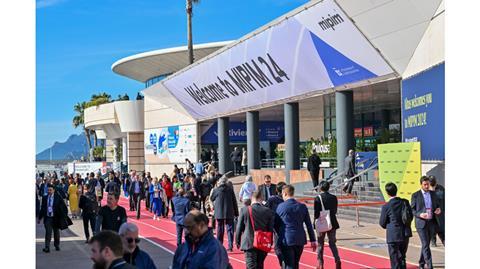Mipim might have been smaller this year, but there was a definite conviction that real estate is entering a new phase in the cycle and values are at or near the bottom.

Tristan Capital Partners' head of investments, Ali Otmar, said: 'Over the last couple of months, actual opportunities are just starting to come in - and this is new since December. The quantity of opportunities is more interesting’.
His colleague, Dan Pottorff, Tristan's head of debt investment, said the same is true of the debt market where his conversations last year were almost all about refinancing, ‘but since January we are seeing more new acquisitions to finance’.
Victor Stoltenburg, managing director at Deka Immobilien and head of transactions and debt, said: 'My activity barometer is our fortnightly investment committee. We used to review around 20 potential investment opportunities each meeting, across all our funds, and by July to December 2023 it was only one or two.
'From January it's risen to 10, so there seems to be more activity and more willing sellers.'
Commerz Real's real estate chief Henning Koch commented: 'We're seeing more and more willing sellers and it feels different to last year. Although the next two years will be pretty tough, I think we are halfway through and the market has nearly bottomed out.
'Now is the time to take advantage and be brave.'
Everyone said Mipm felt smaller than times past with numbers down significantly, but there were still plenty of useful conversations taking place between the people who came: 'It feels more concentrated and concrete than last year,' said Peter Axmann, head of real estate at Hamburg Commercial Bank.
The beginning of the move by sellers is coming from many directions. Partly it is simply the time that has passed since the shock of the rapid rise in interest rates and the stabilisation now that they have stopped rising. Consequently, some investors want to sell to deploy capital into other opportunities or want to divest assets which need intensive capex.
Some of the movement is from owners who have lost control of assets, either to their lenders or the busy insolvency receivers in Germany where distress is most prevalent and was much talked about.
See also: The hard work starts to solve Germany's wave of insolvencies
'Stress cycles take time to build up, but after 18-24 months there is sufficient pressure in the system for things to sell at clearing prices', Otmar observed.
The consensus at Mipim was that most sectors are now at, or very near the bottom. Logistics, well known for having repriced first and fast, has settled at yields around 5% for good product, while Jeremy Eddy, head of living at CBRE, said that prime multifamily residential has transacted at close to 4% in London and prices are now settling in some markets for student housing at levels around 4.75%.
Meanwhile, shopping centre sales prices vary very much asset by asset - but they are trading and while it's been opportunity capital partnered with operators who've made the first moves, there was talk at Mipim of institutional investors being able to invest selectively by the second half of the year. Liquidity is deepening for retail parks and 'retail is off the naughty step' as Nuveen's head of European retail, Steve Wicks memorably put it.
Offices, however, especially in Germany, remain the problem in terms of finding a floor in pricing.
The lack of deals and therefore of comparables, is causing headaches for the German banks who all complained in Cannes about the scrutiny they are getting from the European Central Bank. One said that, to his knowledge, the ECB had visited them all, and told them it thought prime office multiples should be more like 15 or 16 times - or over 6% - than banks' average 20 times or 5%
Stoltenburg said: ‘The ECB is pushing the banks to revalue to lower levels, meaning that the real LTV levels are higher. Germany needs some good deals to establish where offices should be and to bring more stabilisation into the market.'
While there is more equity capital looking at real estate again, the institutional capital is not as ready to commit as the value add and opportunistic investors.
Capital has to be flexible and ready to move fast - Real IS which has just structured the sale of its own Munich HQ, did the deal for a club of savings bank investors. Commerz Real closed the biggest transaction in Munich so far this year - Maximilianstrasse, an asset owned by developer Centrum which went into insolvency - in an off-market deal for a wealthy individual client of Commerz Real parent Commerzbank.
Fund managers were reporting that it is much, much harder to raise capital and that the days of raising blind funds is over - for the time being at least.
There are some serious overseas investors, from the US, Asia and the Middle East, who have capital ready to invest now. GIC wants to do office development in Germany, while Samsung plans to put substantial capital into the residential sectors with Savills Investment Management. BlackRock has billions to invest in European real estate.










